Sourdough Potato Buns
Sourdough Potato Buns are super soft with just a hint of sweetness. Active sourdough starter gives the buns great flavor and texture.
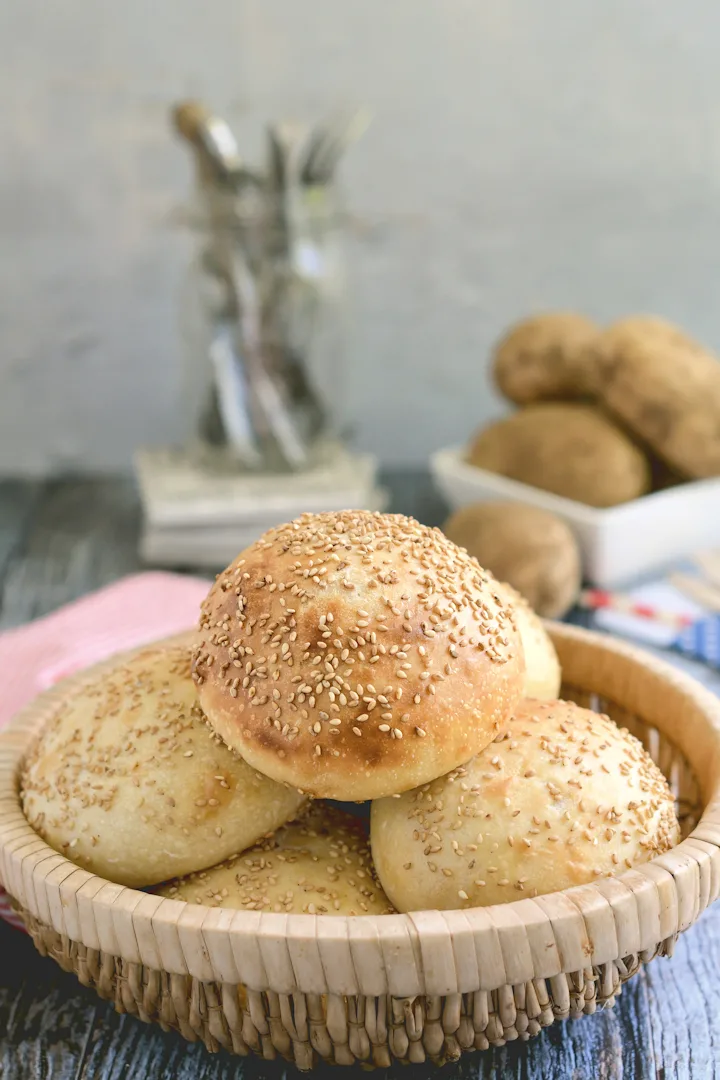
It’s grilling season! Is there anything as satisfying as a juicy burger, hot off the grill?
We spend lots of time thinking about what type of meat (or meat substitute) we should use to make the burger, and what type of fixins to put on top of the burger, but what about the bun?
A good burger bun should be soft enough so you can bite into the burger without all the toppings squishing out. But the bun should also be substantial enough to hold up to the burger juices and toppings without disintegrating.
Most of us just buy packaged buns without even thinking about making our own. But I can tell you that Sourdough Potato Buns will ruin packaged burger buns for you. But don’t worry, they’re really very easy to make with no deep bread-baking knowledge required.
If you don’t have one, you can learn How to Make a Sourdough Starter. Then I can show you how to Feed and Maintain Sourdough Starter or How to Keep a Small Sourdough Starter.
In the meantime, you cake make Potato Buns with commercial yeast. You can also visit that post to find out the science behind why potato buns are so soft and moist.
Scroll through the process photos to see how to make Sourdough Potato Buns:
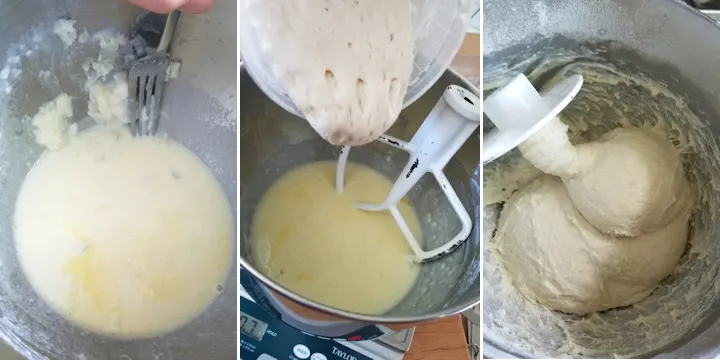
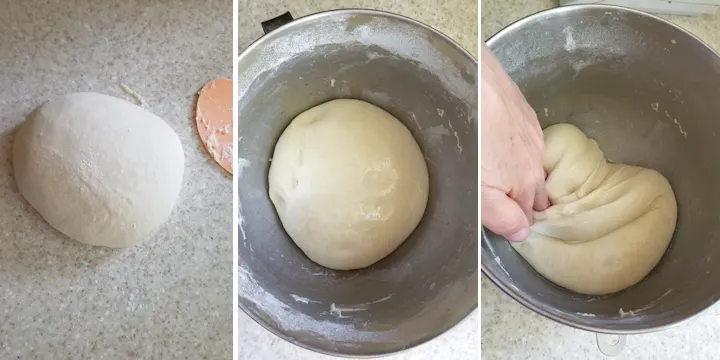
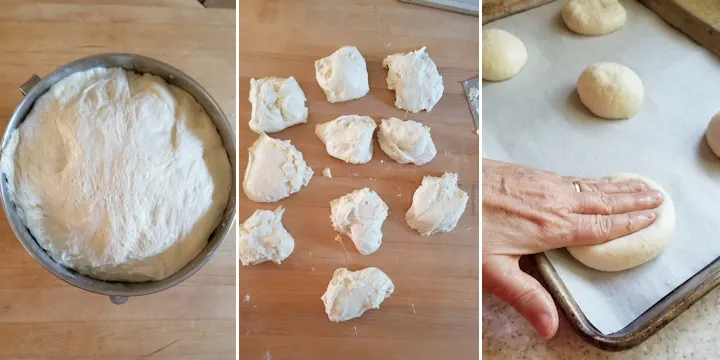
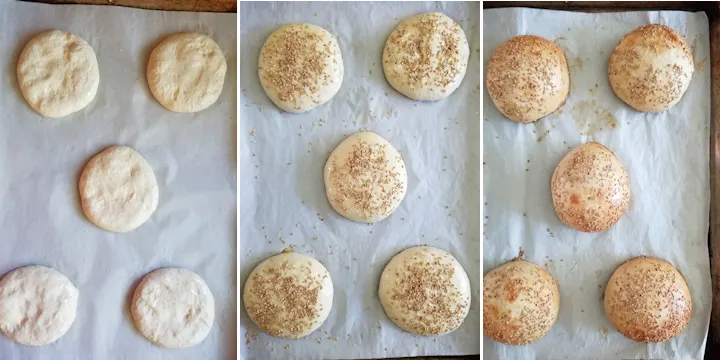
A timeline for making Sourdough Potato Buns:
- If your starter needs feeding, do that the night before or early in the morning of the day you want to make the dough.
- If you want to make dough the same day that you will bake, mix the dough first thing in the morning. This means your starter should probably be fed the night before. Allow the dough to ferment at room temperature during the day. By later in the afternoon the buns should be ready to bake and will be fresh for dinner.
- If you want to make the dough the day before baking, mix the dough in the afternoon. Allow it to ferment at room temperature during the day. Refrigerate the dough in the evening before going to bed.
- The dough can stay in the refrigerator for up to 2 days at this point.
- Take the dough out in the morning, shape the buns and set them aside to rise. The rise will take longer since the dough is cold.
If you start early, you can make the dough in the morning and have fresh burger buns ready by the time you fire up the grill for dinner. But please don’t limit yourself to using them for burgers, they’re also fantastic for sandwiches.
Want a great burger to go on your fresh baked burger buns? How about Chicken Satay Burgers for a change? You should also try my Milk & Honey Whole Wheat Burger Buns for a change of pace.
Now that your family is spoiled, you’ll probably need to make Homemade Hot Dog Buns too.
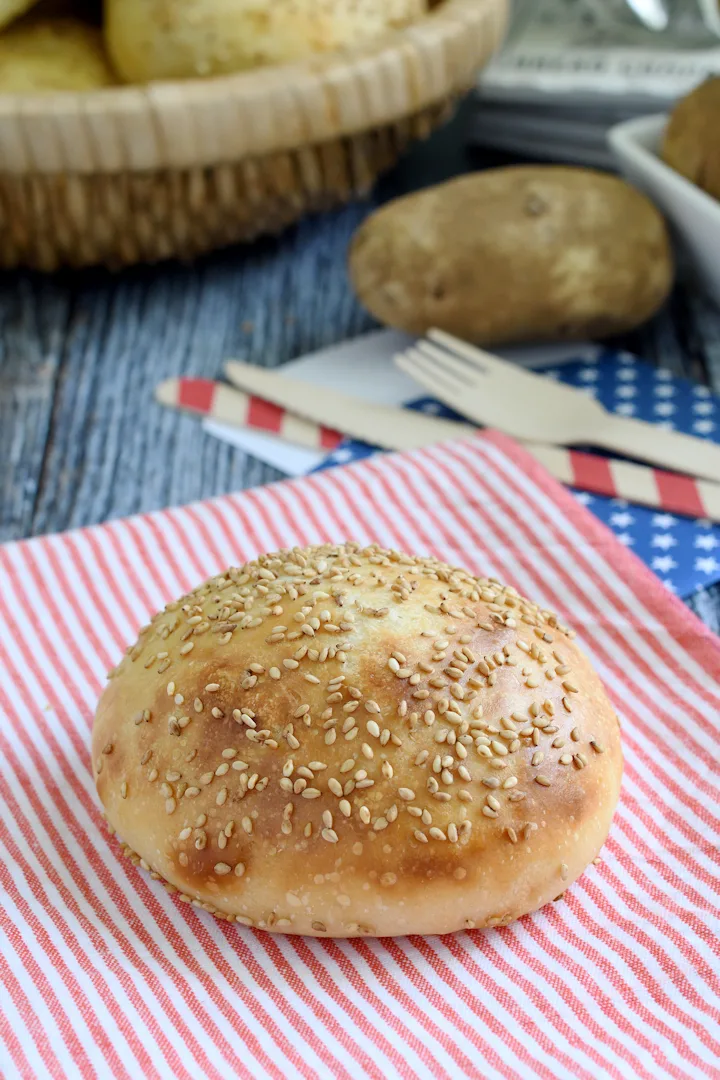
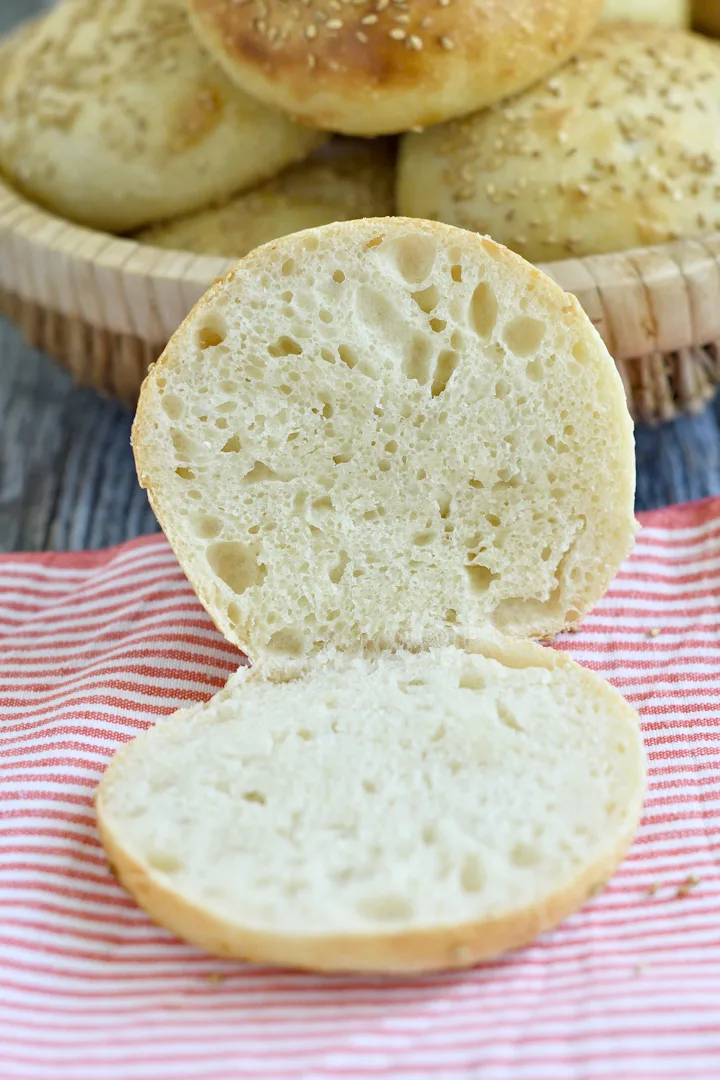
If you love this recipe as much as I do, I’d really appreciate a star rating and a quick comment. Ratings and comments help my recipes show in search results. Thanks!
Sourdough Potato Buns
Ingredients
- 8 oz russet potato (1 medium)
- 12 oz whole milk (1 ½ cups)
- 1 oz unsalted butter
- 1 oz granulated sugar (2 tablespoons)
- 1 ½ teaspoons table salt
- 1 large egg
- 8 oz active sourdough starter (1 cup, 100% hydration)
- 15 oz bread flour (3 cups, see note)
- 1 egg for egg wash
- Sesame seeds for garnish (optional)
Instructions
- Peel and chop 8 oz russet potato to 1" dice. You should have 1 heaping cup of diced potatoes. In a small saucepan, combine 12 oz whole milk and diced potato. Bring the milk to a simmer and cook until the potato is very tender. Stir frequently and watch the pot for boil overs.
- Remove the pan from the heat. Transfer the milk to a large mixing bowl or the bowl of a stand mixer. Add 1 oz unsalted butter and use a fork or potato masher to mash the potato into the milk. Add 1 oz granulated sugar,1 ½ teaspoons table salt and 1 large egg. Check the temperature. If needed, cool until the mixture is about 110F, or slightly warmer than body temp.
- Add 8 oz active sourdough starter and 1 cup of the bread flour and mix on low speed to form a thick batter. Switch to the dough hook or use a wooden spoon or spatula to mix by hand. Add the remaining bread flour and mix until the dough clings to the hook and clears the sides of the bowl. Knead for 5 minutes to develop the dough. Dump the dough onto a floured surface and knead to form a smooth ball. The dough should be soft, smooth and a little sticky.
- Transfer the dough to a lightly oiled bowl, turning once to coat the dough. Cover the bowl and set it aside at room temperature for 3 hours. Every hour or so check on the progress of the dough by folding it over itself in the bowl. This will help redistribute the yeast too. After about 3 hours the dough should be lively, elastic and airy. If the dough is still sluggish give it another hour or two at room temperature.
- If you want to finish making the buns the next day cover the bowl tightly and refrigerate overnight. The next morning continue with shaping. Otherwise continue shaping the buns on the same day.
- Turn the dough out onto a lightly floured surface and knead to form a smooth ball. Divide the dough into 10 equal portions (see note). Roll each portion to a ball and set them a parchment lined baking sheet. Wet your hands and flatten each ball to a disc about 1" thick.
- Cover the sheet pan and allow the rolls to rise until almost doubled in size (about 1 ½ hours, longer if the dough is cold). Press a roll with your finger. If it springs right back it's not ready, if the dent slowly fills in the rolls are ready to bake.
- Meanwhile, preheat the oven to 400°F.
- Brush the tops of the buns with egg. Sprinkle each bun generously with sesame seeds. Bake until the buns are golden brown and feel light when lifted off the sheet pan, about 10-15 minutes. Allow to cool completely before slicing.
Would you like to save this recipe?
As an Amazon Associate and member of other affiliate programs, I earn from qualifying purchases.

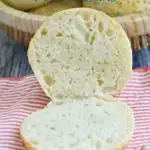
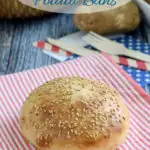
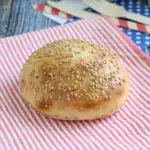




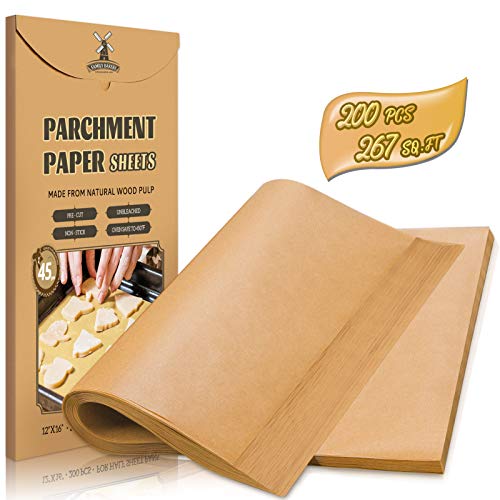
Hi just a quick question. How many grams would each bun weigh? I’m thinking of making these for pulled pork sandwiches. I love that you have it in metric. But just wondering about the weight of each bun – larger bun.
Thanks,
Sharon
What I usually do is weigh the entire batch of dough then divide by the number of buns I plan to make. For example, if the dough weighs 1200 grams and you are making 10 buns each would be 120 grams.
Hello Eileen,
I love your recipes. Done already this one many times and the sourdough pizza is our favorite. Making it almost every week.
Noticed that there is something off with this recipe this time. I know that some time ago you changed something on the website and there is something also in the pizza recipe instructions. Here it says 5oz of flour which I think should be 15? Thinking this because 5 is way too little and in the brackets says 3cups, but 5oz is only 1.
Oh my! Thanks for pointing that out. When I converted all my recipes to a new card I clearly made some errors. It’s been fixed.
@Eileen Gray,
Would metric be 425gm?
Thanks for pointing that out. I needed to have the card recalculate the metric amount. I thought it would do it automatically.
I made these tonight- I started them the day before so they had to go in the fridge overnight but I took them out before I left for work then finished when I got home 8hrs later. they are delicious. I used leftover mashed potatoes – they were made with milk and butter so I didn’t add anymore of that. I did warm them up a bit to melt the sugar and only used 1TBS of sugar. I made 8 rolls and they did bake about 20 min but my oven is not always to temp. I had purchased some bread bags online for my sourdough bread but they are plastic. Is that the best way to store these rolls? I did let them cool down but wondering if a different bag would be better. You say they freeze well. What is your process for that? Thank you for the recipe. I will make them again!
To freeze all my bread I let them cool at room temp. I slice rolls and cut bread loaves into slices. Then I pack them into gallon size freezer bags.
Anyway these can be made gluten free?
Sorry, gluten free is not my specialty.
I have been making your sourdough recipes for a while now and I have had great success with them. I like that a large amount of the the sourdough is used and I think it adds to my success. I have made this potato roll recipe several times as rolls, but am also cooking in a loaf and it really makes a wonder slicing bread.
I, for one, really appreciate the work you put into the recipes which make MY efforts so successful. Thanks.
I like the idea of making this into a loaf.
This recipe looks delicious! Is there a substition I could make for the milk?
You could probably use almond milk or another non-dairy milk.